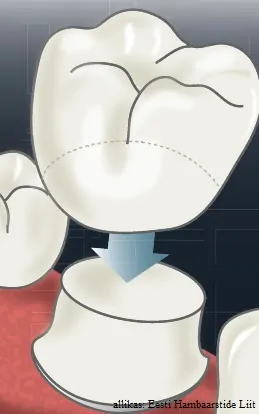What should be taken into account in case of dental crowns?
- If a dental crown is applied to a tooth with a live nerve, there is a risk that the tooth remains sensitive following the polishing.Treatment: The dental crown is applied with temporary cement that has soothing properties. In the event that the tooth is very sensitive or painful, the patient receives root canal treatment, and after some time the dental crown is applied with permanent cement.
- Bacteria are prone to collect under the edges of the crown and cause caries.
Treatment: proper crown edges and smooth transitions from crown to tooth are easy to clean. This problem is very rare with today’s accurate methods. In daily dental care, the patient needs to supplement the brushing of teeth regularly with dental floss, mouth wash and we recommend also using the air-floss device from Philips. Air-flow procedure should be carried out once a year.
- Lifetime of a tooth covered with a dental crown is approximately ten years.
Explanation: this is very different for teeth that have undergone root canal treatment and teeth with a live nerve. Tooth that has undergone root canal treatment becomes more brittle over the years anyway. The crown therefore has a risk of breaking. However, if the tooth is not crowned, there is an increased risk that the tooth with a large filling might break already in a few years.
- Tooth with a live nerve that has a functioning metabolism does not break very easily. Dental crown is necessary should the edge of the gum change for some reason and a gap develops between the gum and the tooth, damaging the neck of the tooth.
- A piece breaks off in the ceramics of the dental crown.
Explanation: this is extremely rare. You should turn to the doctor that applied the crown.
Please find the price for dental crowns HERE


